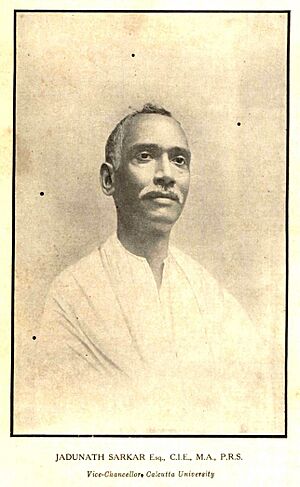Jadunath Sarkar facts for kids
Quick facts for kids
Jadunath Sarkar
CIE FRAS
|
|
|---|---|

Sarkar, 1927
|
|
| Born | 10 December 1870 |
| Died | 19 May 1958 (aged 87) Calcutta, West Bengal, India
|
| Occupation | Historian |
| Spouse(s) | Lady Kadambini Sarkar |
Sir Jadunath Sarkar (Bengali: যদুনাথ সরকার; born December 10, 1870 – died May 19, 1958) was a very important Indian historian. He was especially known for his deep knowledge about the Mughal dynasty.
Sarkar first studied English literature and worked as a teacher. Later, he decided to focus entirely on researching and writing history. He knew the Persian language very well, which helped him read old documents. All his books were written in English. He was also the Vice-Chancellor (VC) of the University of Calcutta from 1926 to 1928. From 1929 to 1932, he was a member of the Bengal Legislative Council. In 1929, the British government gave him the title of "Sir" (knighted him).
Contents
Early Life and Education
Jadunath Sarkar was born on December 10, 1870. His family lived in a village called Karachmaria in Natore. His father, Rajkumar Sarkar, was a local Zamindar, which meant he owned land.
In 1891, Jadunath finished his English studies at Presidency College in Calcutta. The next year, in 1892, he achieved the highest score in the Master of Arts exam in English at Calcutta University. In 1897, he received a special award called the Premchand-Roychand Scholarship.
Academic Career and Teaching
In 1893, Jadunath Sarkar started teaching English literature. He worked at Ripon College in Calcutta, which is now called Surendranath College. In 1898, he joined Presidency College, Calcutta after passing a special exam for teachers.
He also taught at other universities. From 1917 to 1919, he taught modern Indian history at Benaras Hindu University. Then, from 1919 to 1923, he taught both English and history at Ravenshaw College in Cuttack. In 1923, he became an honorary member of the Royal Asiatic Society in London. This was a big honor for him.
In August 1926, he was chosen to be the Vice-Chancellor of Calcutta University. This is a very important leadership role in a university. In 1928, he became a special lecturer at Madras University.
Special Honors and Awards
Jadunath Sarkar received several important honors from the British government. He was given the title of Companion of the Order of the Indian Empire (CIE). He was also made a "Knight" in 1929, which meant he could use the title "Sir" before his name.
He officially received his knighthood on August 22, 1929. The ceremony took place in Simla, and the acting Viceroy, Lord Goschen, presented him with the honor.
Jadunath Sarkar's Legacy
Jadunath Sarkar left behind a lasting legacy. His house in Calcutta was given to the state government by his wife. Today, this house is home to the Centre for Studies in Social Sciences, Calcutta. This center is a special place for research.
The house also has the Jadunath Bhavan Museum and Resource Centre. This is a museum and archive. It keeps many original historical documents and materials that help people learn about the past.
Books and Writings
Sir Jadunath Sarkar wrote many important books about Indian history. Here are some of his published works:
- Economics of British India (1900)
- The India of Aurangzib (1901)
- Anecdotes of Aurangzib (1912)
- History of Aurangzib (in 5 volumes), (1912–24)
- Chaitanya's pilgrimages and teachings, from his contemporary Bengali biography, the Chaitanya-charit-amrita: Madhya-lila (translation from the Bengali original by Krishnadasa Kaviraja, 1913)
- Shivaji and his Times (1919)
- Studies in Mughal India (1919)
- Mughal Administration (1920)
- Nadir Shah in India (1922)
- Later Mughals by William Irvine (in 2 volumes), (edited by Jadunath Sarkar, 1922)
- India through the ages (1928)
- A Short History of Aurangzib (1930)
- The Fall of the Mughal Empire (in 4 volumes), (1932–38)
- Studies in Aurangzib's reign (1933)
- The House of Shivaji (1940)
- The History of Bengal (in 2 volumes), (1943–1948)
- Maāsir-i-ʻĀlamgiri: a history of the emperor Aurangzib-ʻl̀amgir (translation from the Persian original by Muḥammad Sāqī Mustaʻidd Khān, 1947)
- Military History of India (1960)
- A History of Jaipur, c. 1503–1938 (1984)
- A History Of Dasnami Naga Sanyasis
 | Misty Copeland |
 | Raven Wilkinson |
 | Debra Austin |
 | Aesha Ash |

